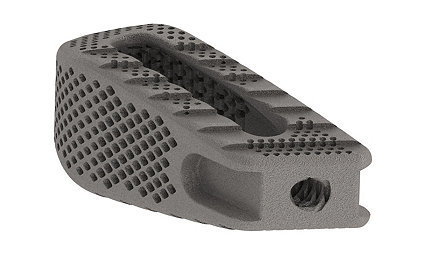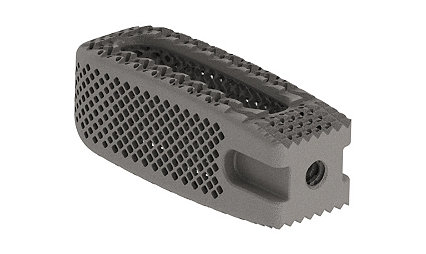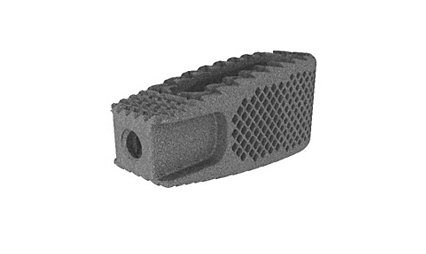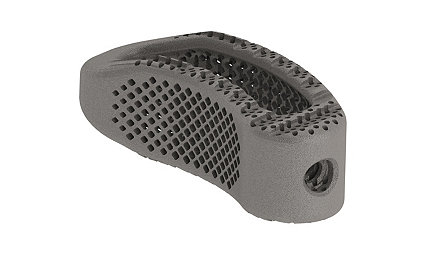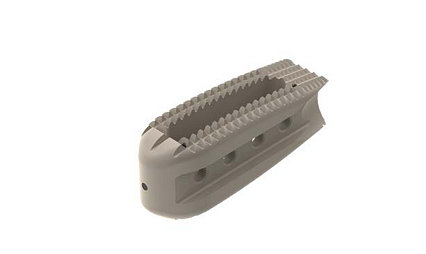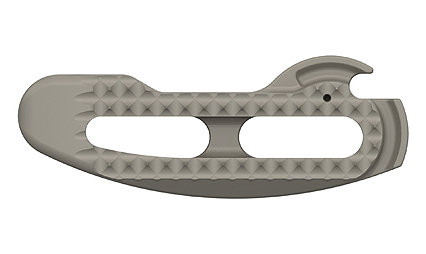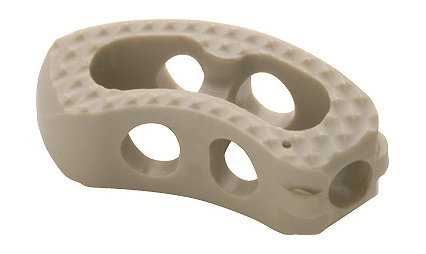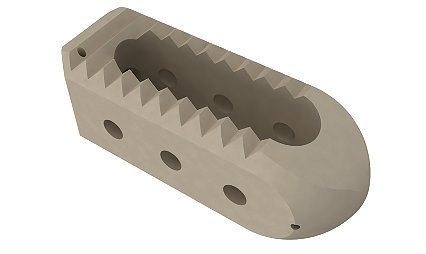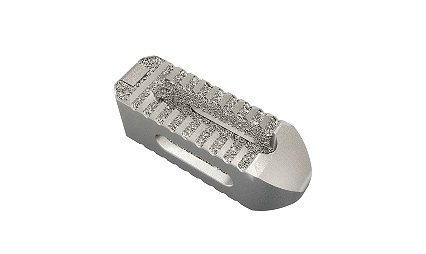Tritanium TL
Curved Posterior Lumbar Cage
A hollow implant that consists of a configuration of both solid and porous structures built using AMagine Technology, our proprietary approach to implant creation using additive manufacturing. This cage is available in a variety of heights, lengths and lordotic angles to accommodate various patient anatomies. Tritanium TL's Anterior Placement System and cage design combine to enable the surgeon's desired apophyseal placement. Tritanium TL complements Tritanium PL, and together they offer alternative posterior lumbar solutions.

Main Features
- Our proprietary Tritanium In-Growth Technology, used to build the Tritanium PL, TL and CCages was designed for bone in-growth and biological fixation [1]
- Porous structure of Tritanium technology is designed to create a favorable environment for cell attachment and proliferation [2,3] and may be able to wick or retain fluid when compared to traditional titanium material [4]
- Porous structures feature randomized pore shape and sizing that are designed to mimic cancellous bone [3,5]
- Interconnected pore structure from endplate to endplate [5]
- Offering two inserter and two tamp options, our system is designed for versatility and procedural flexibility in open and MIS procedures
- With a curved shape and a roughened Tritanium surface featuring multi-directional teeth, the cage is designed to provide tactile feedback as it is steered to the surgeon's desired placement [6]
- Created to allow imaging [7]
- Developed to minimize subsidence [8]
- Empowered by AMagine Technology - our proprietary approach to implant creation using additive manufacturing
References:
1. PROJ 43909 | Tritanium technology claim support memo
2. RD0000053710 | Tritanium cell infiltration and attachment experiment
3. Karageorgiou V, Kaplan D. Porosity of 3D biomaterial scaffolds and osteogenesis. Biomaterials 2005;26:5474–91
4. TREP0000053045 | Tritanium wicking verification study
5. DHF0000054069 | Tritanium TL Design History File
6. Tritanium TL Validation Lab Report 0354
7. PROJ0000056903 | Tritanium TL implant imaging marketing memo
8. PROJ0000056427 | Tritanium TL subsidence marketing memo
Related products
Cascadia AN Lordotic-Oblique 3D
The Cascadia AN Lordotic-Oblique 3D Interbody System includes a full range of anatomically designed interbodies for multiple spinal applications. This system is designed to offer a comprehensive solution for the restoration and maintenance of disc height to facilitate sagittal balance in the lumbar spine. Lamellar 3D Titanium Technology incorporates 300-500 μm longitudinal channels, which in conjunction with transverse windows can create an interconnected lattice designed to allow for bony integration. [1,2]
Learn moreCascadia AN 3D
The Cascadia AN 3D Interbody System includes a full range of implant sizes carefully designed to accommodate the vertebral anatomy. This system is used in conjunction with instrumentation that allows for both direct implant insertion and in-situ rotation. Lamellar 3D Titanium Technology incorporates 300-500 um longitudinal channels, which in conjunction with transverse windows can create an interconnected lattice designed to allow for bony integration. [1,2]
Learn moreCascadia AN Lordotic 3D
The Cascadia AN Lordotic 3D Interbody System includes a full range of anatomically designed interbodies for multiple spinal applications. This system aims to assist in the restoration and maintenance of disc height and sagittal balance in the lumbar spine. Lamellar 3D Titanium Technology incorporates 300-500 μm longitudinal channels, which in conjunction with transverse windows can create an interconnected lattice designed to allow for bony integration. [1,2]
Learn moreCascadia TL 3D
The Cascadia TL 3D Interbody System includes a full range of implant sizes designed to accommodate the vertebral anatomy. The streamlined instrumentation is designed to aid in consistent and accurate implant placement. Lamellar 3D Titanium Technology incorporates 300-500 um longitudinal channels, which in conjunction with transverse windows can create an interconnected lattice designed to allow for bony integration. [1,2]
Learn moreAleutian Anatomically-Narrow Lordotic
The Aleutian Anatomically-Narrow (AN) Lordotic Interbody System has a full range of anatomically-designed PEEK interbodies for multiple spinal applications. The system is designed to offer a comprehensive solution to help achieve sagittal balance in the lumbar spine.
Learn moreAVS Navigator
Steerable posterior lumbar PEEK spacer with a large bone graft chamber and multiple sizing options. This system features a PEEK Spacer with a wedge nose design on the leading edge to help you slide the spacer along the ventral annulus, as well as a back rail on the trailing end of the spacer to help facilitate an 80° interdiscal turn. The AVS Navigator Spacers and instrumentation can be used for open, mini-open and MIS spinal procedures.
Learn moreAVS TL
Curved posterior lumbar PEEK spacer with a large bone graft chamber and multiple sizing options
Learn moreOIC UniLIF
Posterior lumbar PEEK spacer designed for both bilateral PLIF and oblique TLIF surgical approaches. We designed these posterior lumbar PEEK spacers to either have standard lengths for bilateral PLIF approaches or longer lengths with obliquely oriented lordotic angles for unilateral TLIF approaches. The latter option allows you to insert a single spacer diagonally across the disc space while still remaining in the appropriate anterior-posterior plane.
Learn moreTritanium PL
A hollow, rectangular implant that consists of a configuration of both solid and porous structures built using AMagine Technology, our proprietary approach to implant creation using additive manufacturing. This cage is available in a variety of widths, lengths, heights, and lordotic angles to accommodate a variety of patient anatomies. It features a large, open graft window as well as a smooth wedge nose to facilitate insertion into the disc space. A threaded inserter connection is designed to promote rigid connectivity and control during insertion.
Learn moreThis document is intended solely for the use of healthcare professionals. The products depicted are in accordance with applicable Regulations and Directives.
Please find our full product disclaimer here.
PRTTL-WB-36_31045


